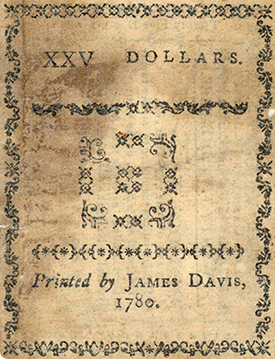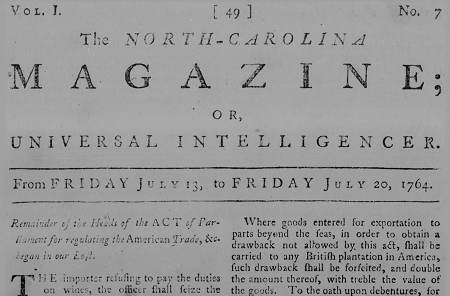21 Oct. 1721–February or March 1785

James Davis, north Carolina's first printer, was born in Virginia. The exact location of his birth is not known, but in 1745 he was living in Williamsburg. He probably learned his trade under William Parks, who established the first press in Virginia at Williamsburg in 1736. Davis came to North Carolina in 1749 to fill the post of public printer, an office created that year by the Assembly to print a revisal of the colony's laws. He set up his print shop on Pollock Street in New Bern, later moving to Broad Street. His first job was printing currency for the province. Not until 1751 did the revisal of the laws appear. Though sometimes called "Swann's Revisal" from the name of the editor, Samuel Swann, the official title was A Collection of all the Public Acts of Assembly, of the Province of North Carolina: Now in Force and Use. Meanwhile, in 1749 Davis published the Journal of the House of Burgesses, North Carolina's earliest imprint.
Davis served as public printer for North Carolina nearly thirty-three years, during which time he printed at least a hundred titles. Most of these were of an official nature. However, he did publish other material. In 1753 he issued Clement Hall's A Collection of Many Christian Experiences, the first nonlegal book written by a North Carolinian published in the province; Clement Hall was rector of St. Paul's Church in Edenton. But before this, in August 1751, Davis began The North Carolina Gazette, North Carolina's first newspaper. Isaiah Thomas, an early historian of colonial newspapers and himself an active printer during and after the Revolutionary period, says the Gazette was discontinued around 1761, though no copies after 1759 have been located. In June 1764 Davis began a second newspaper, The North-Carolina Magazine: or Universal Intelligencer. He continued to publish it under this title until 1768 when he returned to his first title, The North Carolina Gazette. He suspended publication in 1778, principally because of the difficulties of publishing as a consequence of the war.

As a newspaper editor and printer, Davis produced work that compared favorably with that turned out by printers in the other colonies. His Gazette, issued weekly, was small, generally four pages, and contained, as did most colonial newspapers, much outside news and a minimum of local news. The circulation, never large, was restricted to the vicinity of New Bern, though advertisements appearing in the paper came from other parts of the province. Davis began to put down roots almost as soon as he arrived in New Bern. He acquired property and in 1753 became a member of the county court, an office he held for twenty-five years. The next year he was elected sheriff of Craven County; he resigned after ten months when he was chosen to represent New Bern in the Assembly, only to be denied the seat because of dual officeholding. In 1755 he was again elected to the Assembly and continued to serve until 1760, the last year representing Craven County. In 1755 Davis was also appointed postmaster of New Bern; in October he was awarded the contract by the Assembly to carry the mail from Suffolk, Va., to Wilmington, N.C. Then, beginning in 1768, he served as justice of the peace in New Bern, remaining in that office until 1778.
As the American Revolution approached, Davis allied himself with those opposing the mother country, opening the columns of his newspaper to stories and essays favorable to the American cause. He became a member of the Council of Safety of New Bern, when that body was formed, and represented New Bern in the provincial congresses. In 1777 the Assembly chose him as one of the judges on the Admiralty Court for the port of Beaufort. He climaxed his political career by becoming a member of the Council of State in 1781.
Clearly, Davis was an active and ambitious man; but he may have been a bit overweening because of the prestige he enjoyed. Also, the many activities in which he engaged surely interfered with his work as public printer. Governor Arthur Dobbs thought so, at any rate; in 1764 he refused to approve Davis's reappointment as public printer, stating that he was negligent in his duties. The governor appointed Andrew Steuart, a printer then residing in Philadelphia. But the Assembly objected to this use of power exercised by the governor and reappointed Davis, at the same time refusing to appropriate any money for Steuart's salary. Dobbs persisted, however, and Steuart settled in Wilmington where, in September 1764, he began publishing a second North Carolina Gazette. It was discontinued three years later. Steuart drowned in 1769 while swimming in the Cape Fear River. Adam Boyd purchased his printing equipment and in October 1769 began the Cape Fear Mercury.
In the Mercury of 22 Sept. 1773 there appeared a confession by one Spencer Dew, who was about to be hanged for horse stealing. Dew said that he had passed counterfeit money printed by James Davis. Whether this was an attempt by certain opponents of Davis to incriminate him, or the effort of a convicted felon to embarrass prominent men, is not clear. In any event the charge had little or no effect on Davis's career. In 1774 he was reappointed public printer while continuing to serve as justice of the peace in New Bern.
In 1776, when an armed ship fitted out by North Carolinians to prey on British shipping anchored in the Neuse River off a plantation owned by Davis, the printer revealed another side to his personality. Davis complained that the crew raided his cornfields. He depicted them as drunk and rowdy idlers, "the most abandoned sett of wretches ever collected together." Others referred to the group as "healthy men all anxious to adventure." This display of temper, however, was mild compared with Davis's conduct toward a French officer who, in 1778, had persuaded the Assembly to allow him to recruit a regiment from among French settlers in New Bern. This officer enlisted a young Frenchman who was an apprentice of John Davis, ship captain and son of the printer. Captain Davis was enraged and, with his father and some twenty seamen from his ship, assailed the regiment's quarters demanding that the young recruit be released. The sergeant on duty refused. Thereupon the elder Davis abused the French officer and threatened to drive every Frenchman out of town along with any who sympathized with them. This latter threat was directed at the other justices of the peace who had earlier refused Davis's demand that the militia be called out. Davis's behavior on this occasion was not widely endorsed in New Bern. Richard Cogdell, a tavern owner and Revolutionary leader, wrote Governor Richard Caswell that "the arbitrary and scandalous behavior of [Davis] in many instances before has given the town a name . . . as every inhabitant except himself and minions would blush at." Yet, Davis still must have been respected, for in 1781 he was elected by the Assembly to the Council of State.
Shortly after arriving in New Bern in 1749, Davis married Prudence Hobbs, widow of Christopher Gregory Hobbs and daughter of William Carruthers. To them were born four sons and three daughters. James, the eldest son, was a merchant in New Bern. John, the ship captain, died while a prisoner aboard a British ship anchored in the Charleston, S.C., harbor. Of the others only Thomas is known to have followed his father's trade. Not only did he assist the elder Davis in his print shop until drafted into the army in 1778, but he also succeeded him as state printer in 1782, a position he held until 1785. In that year James Davis died in New Bern. His will was probated at the March term of court.